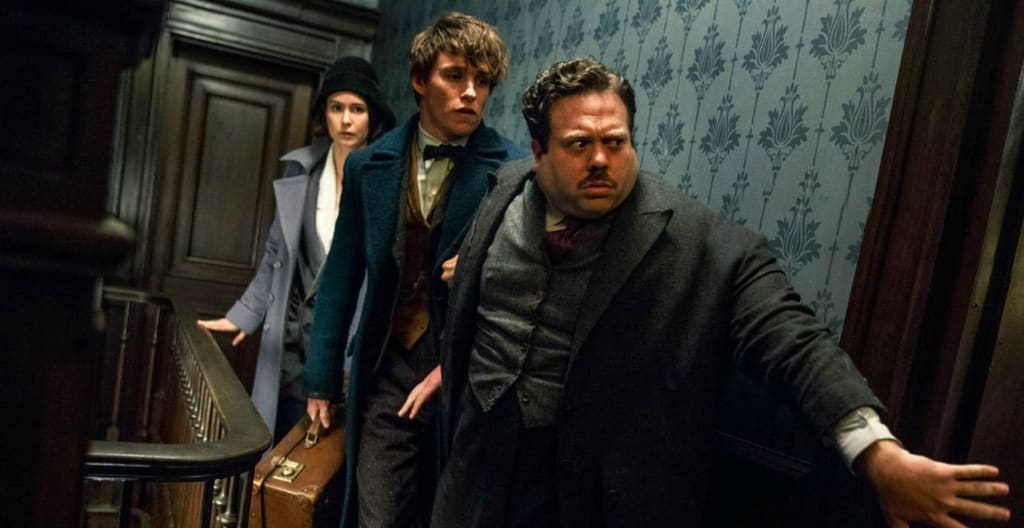
Although Fantastic Beasts is the first in a series of five films, J. K. Rowling has played it pretty smart; the movie works as a stand-alone, meaning if (by some unbelievable misfortune) it fails to perform as well as hoped, the series can be ended without leaving fans with too many loose ends.
So Fantastic Beasts concludes in an upbeat, optimistic manner; there are hints of blossoming romance between Eddie Redmayne's Newt and Katherine Waterston's Tina; the villainous Grindelwald is imprisoned; and the disastrous war between No-Majs and Wizards is successfully averted. Although Dan Fogler's Jacob has had his memory wiped, he clearly has a subconscious recollection of the Wizarding World, and there are promising signs that he'll wind up with Alison Sudol's Queenie after all.
Dig a little deeper, though, and the ending is a lot less optimistic than you'd think...
The Jacob Factor
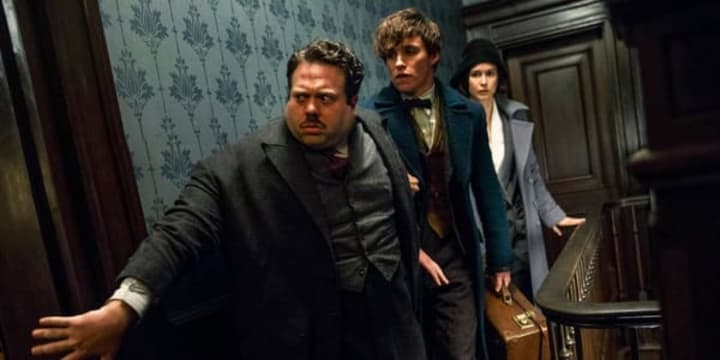
He certainly experienced a lot! Image: Warner Bros.
Jacob Kowalski is the key. He's a wonderful character, adding real humor and joy to Fantastic Beasts, and he gets the ending we want him to get; he clearly still has some vague recollection of magic, buried deep down in his subconscious. He designs his pastries in unusual shapes that resemble the creatures he saw, and he seems to recognize Queenie as soon as he sees her.
All of which means the memories aren't buried so deep as the Wizards would perhaps like. Perhaps Newt's potion was diluted by the sheer amount of rain; whatever the reason, the obliviatory impact hasn't been half so powerful as he hoped.
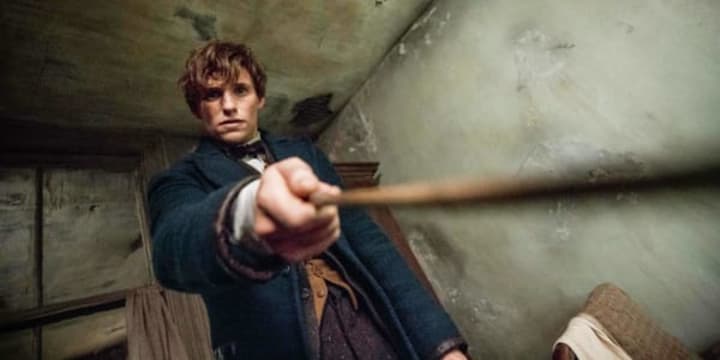
Newt may not have been so successful as he thought. Image: Warner Bros.
That means the memory of the magical incidents is only buried so deep. Perhaps it's the case that Kowalski resists the memory-wipe more because of the depth of his emotions; in which case, Jon Vought's Shaw Senior, a newspaper owner who has watched his favorite son killed before his eyes, will most certainly have some half-conscious recollection of the magic that slaughtered his progeny. The same is true for Ronan Raferty's Langdon Shaw, whose inquisitive nature already seems drawn to the concept of magic.
The truth is that New York is a city heading towards a crisis, where Wizarding and No-Maj society collide. Newt has averted the disaster; but the memories are still there, and over time will build up until they explode to the fore once again.
The Second Salemers will be in disarray after the death of their leader, Samantha Morton's Mary Lou. None will have been more affected than Modesty Barebone, played by Faith Wood-Blagrove. She didn't just see Mary Lou die; she realized her adoptive brother Credence, played by Ezra Miller, was responsible. She fled from Credence, and then saw his power. If anyone is likely to remember the events of New York, it's Modesty.
In the original casting call for the character, Warner Bros. described Modesty like this:
‘Modesty’ is a haunted young girl with an inner strength and stillness. She has an ability to see deep into people and understand them.
I can't help wondering if Credence was the only magician picked up by Mary Lou. It's possible that Modesty's remarkable sense of empathy is actually magical, and that this conflicted young child is another Obscurial. After all, Grindelwald expected a female Obscurial as a result of his vision; perhaps he wasn't wrong after all. Perhaps there were actually two Obscurials...
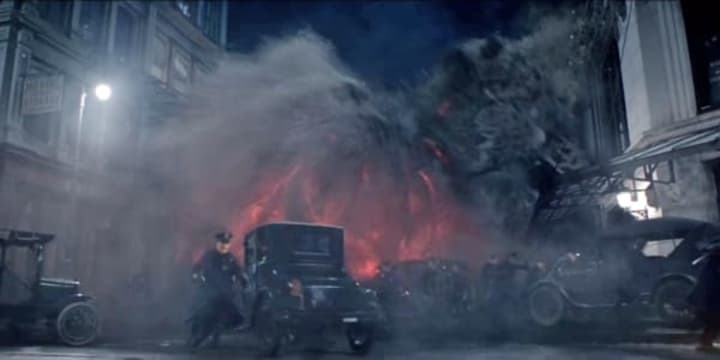
Could there be another Obscurus? Image: Warner Bros.
Whether I'm right about Modesty being an Obscurial or not, the fact remains that she has a deep hatred of Wizardkind — as seen by the songs she sings — and now has an even deeper, albeit buried, reason to hate them. I strongly suspect that this character will become increasingly important in the sequels.
Grindelwald
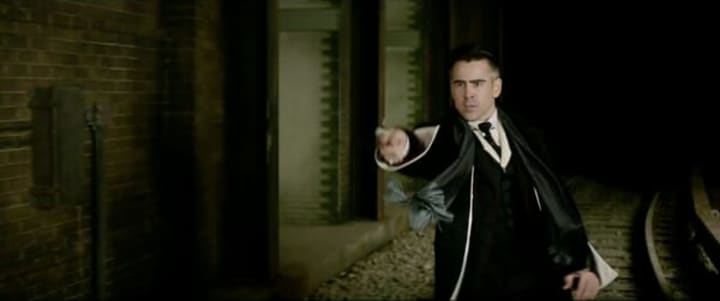
One very dangerous man. Image: Warner Bros.
Of course, we all know that Grindelwald is going to escape; Fantastic Beasts itself doesn't pretend otherwise. We know that the late 1920s and 1930s will see Grindelwald rise to power in Europe, and he ultimately has a date with destiny — and Dumbledore — in 1945, where he'll finally be defeated.
Why was Grindelwald seeking an Obscurus? It seems likely that his main motivation is to expose the Wizarding World, bringing the Wizards and the No-Majs into collision. Only by exposing the Wizards can Grindelwald force his fellows to take over. In New York, he now has an entire city just waiting for the slightest hint of the supernatural.
For all the upbeat joy of Fantastic Beasts's conclusion, the truth is that it leaves New York as a powder keg - and even leaves two matches, Modesty and Grindelwald, just ready to set it alight. We know that dark days are coming for the Wizarding World (and for the Muggle world as well); it looks likely that New York will continue to be at the center of events.
About the Creator
Tom Bacon
A prolific writer and film fan, Tom has a deep love of the superhero genre.


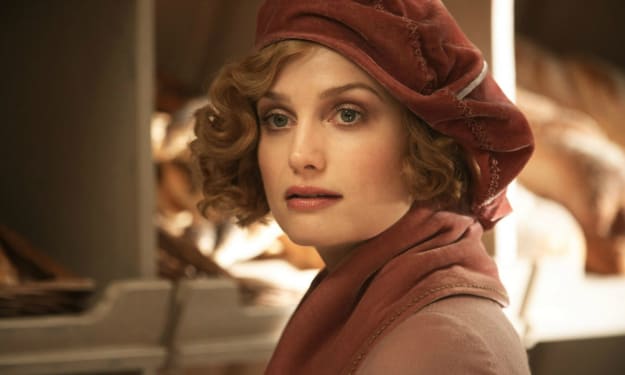

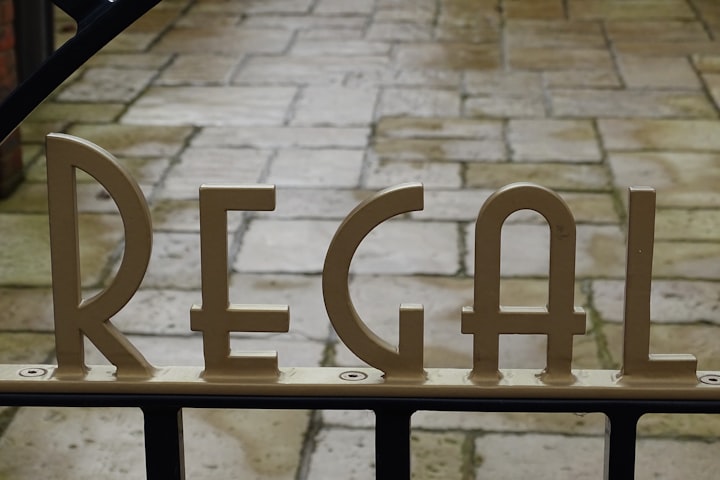

Comments
There are no comments for this story
Be the first to respond and start the conversation.